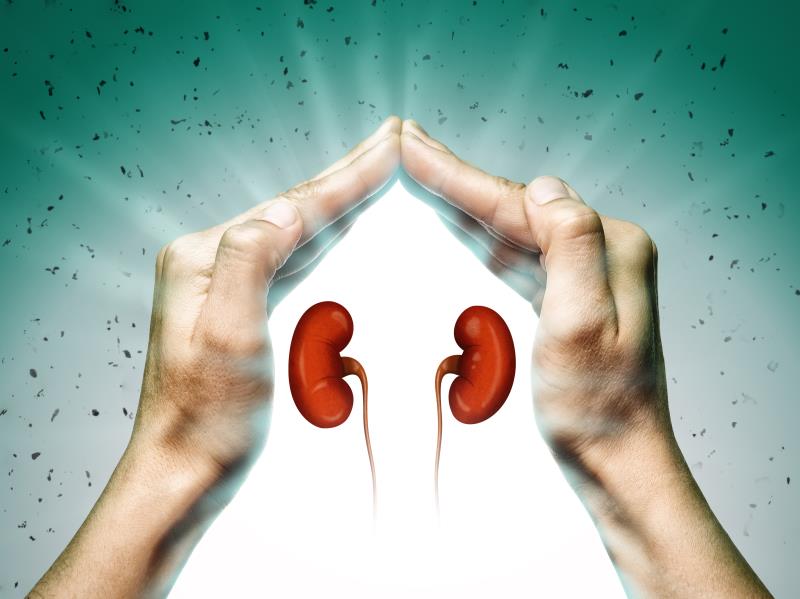Gastric bypass may encourage early-stage CKD remission





Remission of albuminuria may be an added benefit of undergoing Roux-en-Y gastric bypass (RYGB) in patients with type 2 diabetes (T2D), obesity, and early-stage chronic kidney disease (CKD), results of the MOMS* trial showed.
“Our findings highlight the potential of RYGB as a new treatment paradigm that should be considered to slow or arrest CKD progression in patients with T2D and obesity,” said the authors.
This single-centre study involved 100 adults (mean age 51.4 years, 55 percent male) with T2D (HbA1c <12 percent), obesity (BMI 30–35 kg/m2), and stage G1–G3 and A2–A3 CKD with microalbuminuria**. They were randomized to undergo RYGB (n=51) or receive best medical therapy (n=49).
After 24 months, patients who underwent RYGB were more likely to experience albuminuria remission (UACR <30 mg/g) compared with those who received best medical therapy (82.3 percent vs 54.6 percent; p=0.006). [JAMA Surg 2020;doi:10.1001/jamasurg.2020.0420]
This resulted in greater estimated early-stage CKD remission rates in the RYGB vs best medical therapy group (81.9 percent vs 48.2 percent; p=0.002). Geometric mean UACR levels were also 55 percent lower in the RYGB vs the best medical therapy group (10.7 vs 23.6 mg/g of creatinine; p<0.001).
Improved non-kidney outcomes
A greater reduction in HbA1c levels was noted with RYGB vs best medical therapy (-2.6 percent vs -2.2 percent; mean difference, -0.54 percent; p=0.048), with more patients in the RYGB than best medical therapy group achieving diabetes remission as per ADA*** (HbA1c ≤6 percent; 45.5 percent vs 24.4 percent; p=0.051).
Among patients with hypertension at baseline, blood pressure levels did not differ between groups. A greater proportion of the RYGB than best medical therapy group achieved targets for LDL-C (<100 mg/dL; 72.6 percent vs 51.2 percent; p=0.05), HDL-C (>50 mg/dL; 44.8 percent vs 18.7 percent; p=0.004), and triglycerides (<150 mg/dL; 80.0 percent vs 41.9 percent; p<0.001).
Compared with best medical therapy, patients who underwent RYGB had greater improvements in BMI (estimated mean, 24.3 vs 31.2 kg/m2; p<0.001) and total body weight (mean change, -25.4 percent vs -4.5 percent). Patients on best medical therapy required more medications for metabolic control than those who underwent RYGB (median 6 vs 1). Insulin or insulin analogue use was less frequent in the RYGB vs best medical therapy group (11 percent vs 54 percent; p<0.001)
Of the 92 patients who underwent assigned treatment, serious adverse events affected a comparable number of patients in both groups (13 percent each). There were no deaths, excessive weight loss, malnutrition, or serious hypoglycaemia incidents.
An added benefit of RYGB
According to the authors, treatments for diabetic kidney disease that confer short- to medium-term improvements in albuminuria may lead to long-term benefits.
“The data … confirm … that RYGB is significantly associated with reduced urinary albumin excretion in patients with T2D and furthermore demonstrate that the judicious use of RYGB with state-of-the-art medication enhances remission of albuminuria and stage G1–G3 and A2–A3 CKD,” they added.
Future research should examine whether sleeve gastrectomy would have a similar beneficial effect, especially where RYGB is contraindicated. The “durability and long-term tolerability” of RYGB is also presently unknown, they said, noting that the “prospective harm-benefit balance and therapeutic gap between surgery and medicine may narrow if the efficacy of new classes of glucose-lowering and bariatric medical therapies is sustained at long-term follow-up.”